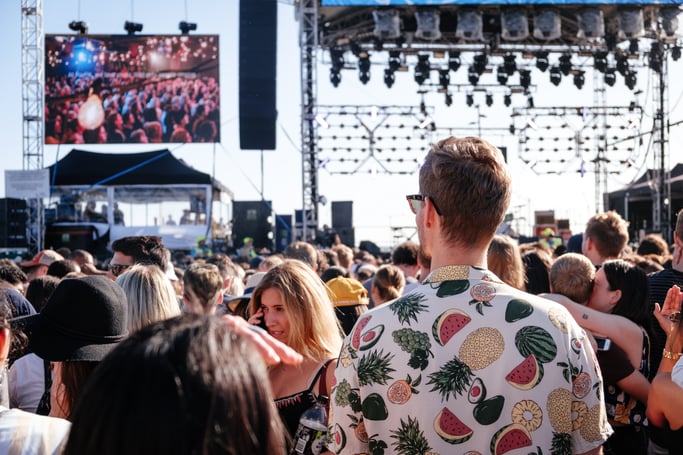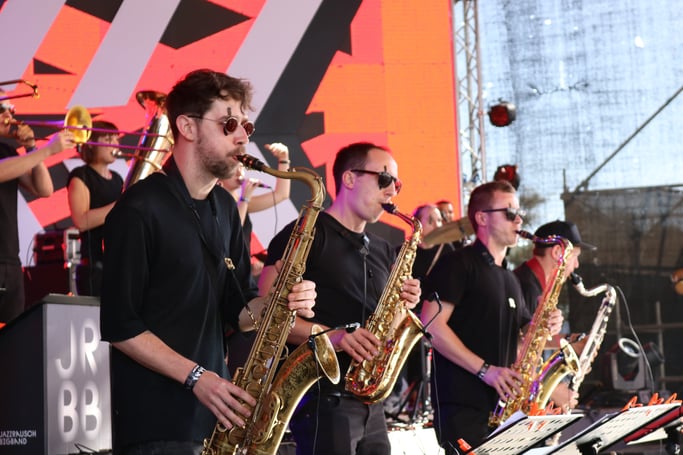Featured photo by Ted Eytan
Music festivals are typically pretty large events, and events require an equally large financial investment. While this may seem like a lot for one person to acquire, spreading it out amongst many is an efficient way to raise funds to make the proposed event a reality. But aside from the finances, what makes sponsorships so important?
The Sponsorship Collective lists publicity and credibility as more reasons sponsors are essential to the success of any music festival. Publicity refers to getting the word out about the event. When the event has sponsors, businesses can promote events throughout their locations which leads to a higher turnout. This allows the music festival to grow and produce a larger attendance. In addition to publicity, credibility is what makes people want to attend, once the festival is on their radar. By having sponsorships, the businesses are publicly stating their support for your music festival.
Gathering assets and inventories
To have something to offer potential sponsors, the first important stage is to determine what you have. This includes where potential logos and banners can be placed, where the main events will occur, and where interactive stands or booths can be set up to further sponsor engagement.
It is often helpful to break down these assets into groups based on their similarities. The following are some common groups of sponsorship activities:
- Paid media
- Social/digital media
- Flyers/programs/newsletters
- Sponsor exhibition booths
- Merchandising
Planning is essential for potential sponsorships. Without a plan, it is unlikely that many businesses will be jumping at the opportunity to contribute financially towards your music festival. Strong planning at the beginning is key towards recurring future success. Now that we have a plan to inventory our assets, how do we go about getting these sponsors?
 Photo by Johan Mouchet on Unsplash
Photo by Johan Mouchet on Unsplash
Acquiring sponsors
The best way to acquire funding for an event is through business sponsorships. In sponsorships, businesses agree to contribute financially to the music festival in exchange for promotion and ads steering festival-goers towards their businesses. Gary Bradshaw of AttendStar Ticketing and Marketing broke it down into three important steps when it comes to acquiring sponsorships. These three key steps are developing sponsorship offers, selling sponsorship offers, and finding sponsors.
This list includes common sponsorship sources and other tactics to secure funding.
1. Tiered sponsorships through local businesses
This is one of the most beneficial aspects of finding sponsors. By supporting different levels of financial support, small and large businesses are both able to contribute to the organization in whatever means they have available. This will attract a wider range of sponsorships and allow for industry diversification.
2. Sponsorship selling
Another important idea that comes with acquiring funds is giving sponsors a reason to invest in your event. Whether this is a logo printed on tickets, a commercial or airplay advertising their services, handouts at the event, or anything in between!
Sponsoring brand visibility works to provide an exchange: the business contributing to financing the event will receive brand publicity and recognition, and the music festival organizer will secure event funding. This provides benefits to both you and the sponsor. You can acquire the funding needed for a successful music festival, and the business will gain publicity, promotion, and advertising.
One thing to note is that working with sponsors can be difficult, especially for large events that have a wide variety of organizations looking to contribute. However, combatting this confusion can be easy! PromoTix offers an awesome solution when it comes to planning in the form of a Sponsor Tracking Sheet. This tool is free to use and utilize and is an excellent way to track where donations are coming from and where they are at in the process.
3. Attitude and presentation matters
Developing relationships with potential sponsors is crucial to the sponsorship process. Many businesses are intrigued by sponsorship pitches, after all, these deals benefit the business, the organization, and the community. However, sponsorships are not always feasible for businesses to contribute to, especially if they are a smaller business that is just beginning itself.
Although some may be unavailable one year, by maintaining positive and professional relationships with businesses you are able to keep the doors open for future partnerships. Word of mouth is also important, particularly at the local level. By upholding professional performance standards, chances are that more businesses will be open to the idea of working with you.
Contrary to this, if you are unorganized or don’t appear to value the sponsorships, they will be less likely to return for a second year. Remember, building relationships is about being authentic, genuine, and real! By upholding a high level of integrity and professionalism, potential sponsors or donors will be more inclined to work with you.
 Photo by Matty Adame on Unsplash
Photo by Matty Adame on Unsplash
Along with professionalism, it is important to be appreciative. This can be done by staying organized, meeting deadlines, and staying in contact with sponsor representatives. Work to ensure the sponsor is happy with their commitment, and be sure to thank them for their involvement. It is helpful to think outside of the box. After a successful event, ensure they receive a thank you letter or message acknowledging their partnership with the event, particularly in their area of involvement.
Remember, sponsorship is a financial investment on the business’s behalf, and it is important to recognize this agreement. Businesses plan to earn something out of the partnership and need to be informed and updated regardless. It is essential to keep sponsors in the loop and provide clear and genuine updates and information for them.
Consider the why
In an ideal world, it would be super nice if sponsors were looking to participate because they especially care about the cause or because they want to support you. Unfortunately with events running as big as music festivals run, this typically isn’t feasible.
Organizations, especially businesses, contribute because they want to see a return on their investment. Of course, this may stem from caring about a particular event, but simply caring or liking an artist is not going to bring in all necessary funding. One idea that particularly appeals to potential sponsors is tangible events and attractions. For example: What is so special about your show that will draw in enough people to notice logos and sponsorships and in turn lean towards spending money there?
Having a fact sheet or brochure is very helpful to put together before pitching to potential sponsors. This sheet may include ideas such as:
- How many years has this event been in operation?
- Will there be admissions tickets offered to the sponsors as a running promotion for staff?
- What attractions and events are offered at the event?
- Where will the sponsor's logo or message be placed?
- How many impressions does this typically garner?
- Do the values of the festival line up with the corporate values of the potential sponsorship organization?
- What will the sponsor receive in exchange for funding?
Preparing this information in advance is important because it not only makes the overall experience for potential sponsors better, but it leaves a good impression in the minds of their organization, which is important for maintaining long-term connections and future sponsorships.
Post-event evaluation
One aspect that is often overlooked in the planning process occurs after the event has ended. While hopefully, you are thinking about what a smashing success the festival was, and cleaning up the event grounds, another important thing to consider is evaluation.
This is important, particularly for annual events. Although it may not seem as important at the time, this final step of evaluation is crucial for future event success. Was the target audience reached? Was the turnout of the festival as expected? Are the sponsors happy with their commitment to contribute towards your event or organization? What improvements can be made for the following years?
Keeping track of and recording this information will only benefit future shows, sponsorships, and event turnouts! It is also important to have a review with all sponsors so that they can see the full value they received from partnering with the event. Being open and clear with sponsors throughout all stages of the event will likely lead to future sponsorships.
 Photo by Peter Okwara on Unsplash
Photo by Peter Okwara on Unsplash
More to learn
Building a knowledge base of what works for you is essential for your music festival success. By scheduling meetings and demos with professionals you can learn more about what various companies and platforms are able to offer you, and how they can support you in planning the best event possible.
We work to bridge the connection between music and finances and is the first company of its kind to offer 100% fee-free ticketing for shows. This not only optimizes artist revenues but creates a better fan experience and ultimately leads to more success.
Here at PromoTix, we want to make your life easier by not only providing free information and planning guides but also offering helpful resources for planning a music festival. Need more help tracking sponsorship tasks? A free Sponsorship Task Tracking Sheet is available for download below.




